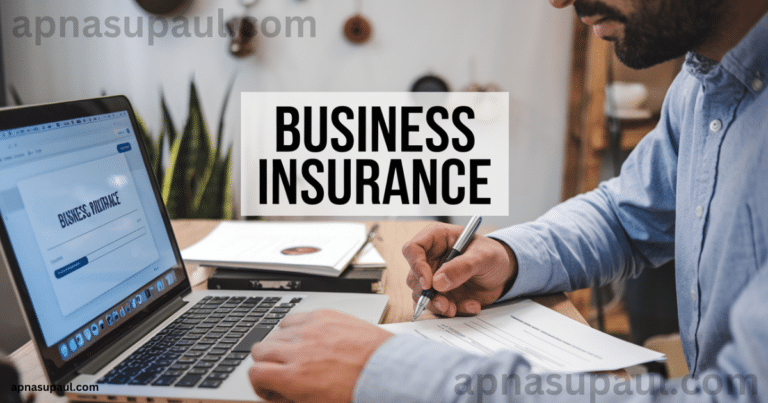Running a business comes with inherent risks. From natural disasters to employee injuries, lawsuits to equipment breakdowns, unexpected events can threaten your company’s financial health. Business insurance acts as a safety net, providing the support you need to recover, rebuild, and thrive during tough times. Here’s how the right insurance coverage can protect your company when the unexpected happens.
Financial Protection Against Property Damage

Natural disasters, fires, theft, and vandalism can cause significant damage to your business property, including buildings, inventory, and equipment. Without insurance, these losses can be financially devastating.
- How it helps: Property insurance covers the cost of repairing or replacing damaged assets, helping you get back to operations quickly.
- Key Example: A restaurant damaged by a kitchen fire can use insurance payouts to rebuild and replace damaged equipment without draining savings or closing permanently.
Liability Coverage Shields Your Business
One of the most common threats to any business is legal liability. A customer slipping in your store, a defective product causing harm, or a service mishap can lead to lawsuits that drain resources and tarnish your reputation.
- How it helps: Liability insurance covers legal fees, settlements, and medical expenses, ensuring you’re not paying out-of-pocket.
- Types of Liability Coverage:
- General Liability: For accidents, injuries, and property damage.
- Professional Liability: For errors, omissions, or negligence in professional services.
- Product Liability: For harm caused by faulty products.
- Key Example: A small tech company sued for a software bug causing client data loss can use professional liability insurance to cover legal costs.
Employee Protection with Workers’ Compensation
Employees are the backbone of your business, and injuries at the workplace can lead to costly medical bills, lost wages, and potential lawsuits.
- How it helps: Workers’ compensation insurance provides coverage for employee injuries or illnesses sustained while on the job, covering medical expenses and lost wages. It also protects your business from employee lawsuits related to workplace injuries.
- Key Example: A construction worker injured on-site can receive treatment and wage compensation without the employer bearing the full financial burden.
Business Interruption Insurance for Unexpected Halts

Events like natural disasters, cyberattacks, or government mandates can force businesses to shut down temporarily, leading to a loss of income.
- How it helps: Business interruption insurance compensates for lost income and operating expenses (e.g., rent, payroll, utilities) during downtime.
- Key Example: A retail store shut down by a hurricane can continue paying employees and covering fixed costs while waiting to reopen.
Cybersecurity Coverage in the Digital Age
As businesses increasingly rely on digital operations, cyber threats like data breaches and ransomware attacks have become significant risks. A single attack can result in financial loss, legal liabilities, and reputation damage.
- How it helps: Cyber liability insurance covers costs related to data breaches, such as notifying customers, restoring data, and legal expenses.
- Key Example: An e-commerce business hit by a ransomware attack can use cyber insurance to recover lost data and pay legal fees without derailing operations.
Commercial Auto Insurance for Vehicle Protection
If your business uses vehicles for deliveries, transportation, or client visits, accidents can lead to costly repairs and liabilities.
- How it helps: Commercial auto insurance covers damages to vehicles, third-party property, and injuries resulting from accidents involving company vehicles.
- Key Example: A delivery van involved in an accident can be repaired or replaced using insurance without impacting the business’s bottom line.
Protection for Key Personnel Loss

Key employees, like executives or founders, are often critical to a company’s success. Losing such personnel due to illness, injury, or death can create financial instability.
- How it helps: Key person insurance provides a payout to help cover revenue loss, hire replacements, or restructure the business in the absence of essential personnel.
- Key Example: A startup relying on its founder can use key person insurance to secure funding and stability during the transition.
Credibility and Peace of Mind
Customers and clients prefer to work with businesses that are insured, as it demonstrates professionalism and reliability. Insurance not only protects against financial loss but also builds trust with stakeholders.
- How it helps: Having the right coverage reassures clients, investors, and employees that the business is prepared to handle unforeseen challenges.
- Key Example: A contractor with liability insurance may win more bids by showcasing responsibility and readiness to mitigate risks.
Compliance with Legal and Contractual Requirements
Certain types of insurance, such as workers’ compensation or commercial auto insurance, may be legally mandated depending on your location or industry. Similarly, clients or landlords may require you to carry specific coverage before signing contracts.
- How it helps: Business insurance ensures compliance with laws and contractual obligations, protecting you from fines and disputes.
- Key Example: A landlord requiring property insurance for a leased office space ensures both parties are protected in case of damage.
Tailored Solutions for Industry-Specific Risks

Every industry faces unique risks, and insurance policies can be customized to address specific needs.
- How it helps: Industry-specific insurance ensures comprehensive coverage for specialized risks, such as food spoilage for restaurants or equipment breakdown for manufacturers.
- Key Example: A farmer protecting crops against weather damage with agriculture insurance avoids devastating financial losses during a bad season.
Tips for Choosing the Right Business Insurance
- Assess Your Risks: Identify potential threats specific to your industry and operations.
- Compare Policies: Shop around for insurers and evaluate coverage options, exclusions, and premiums.
- Work with an Expert: Consult an insurance broker to ensure you’re adequately covered.
- Review Regularly: Reassess your coverage annually to account for business growth or changing risks.
Also Read : Protect Your Castle: Unveiling The Power Of Property Insurance

